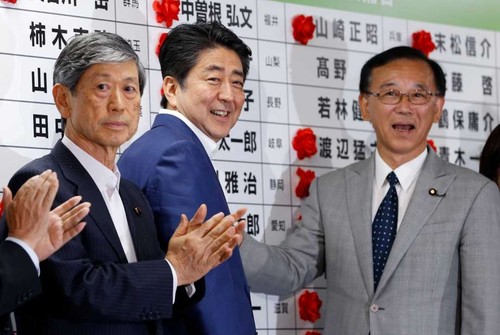(VOVworld) – Prime Minister Shinzo Abe’s Liberal Democratic Party (LDP) and its coalition partner the Komeito party won Japan's House of Councilors election on July 10. The result reflects the people’s trust in the ruling coalition and generates conditions for Prime Minister Shinzo Abe to carry on his constitutional reform and economic policies, known as Abenomics.
 |
Japan's Prime Minister Shinzo Abe, center, and leader of the Liberal Democratic Party, smiles as he places a red rosette on the name of his Liberal Democratic Party's winning candidate during ballot counting for the parliamentary upper house elections at the party headquarters in Tokyo, Sunday, July 10, 2016 (photo: Shizuo Kambayashi, AP)
|
Japanese law calls for a House of Councilors election every three years to choose one-half of its 242 members. Official results announced on public media on July 17 showed that the Liberal Democratic Party (LDP) had won 56 seats and its coalition partner the Komeito party had won 14 seats. The ruling coalition has secured a two-thirds majority of the 242 House of Councilors seats and will continue to control both houses.
The victory has given Prime Minister Shinzo Abe the necessary conditions to pursue his policies, which economic reforms popularly called Abenomics. Abe’s government has pledged to implement ambitious economic measures to stabilize Japan’s economy. During the election campaign, the LDP highlighted Abenomics’ achievements, including improvement in the labor market, higher salaries, and a reduction in the number of bankruptcies.
Prime Minister Abe said the upper house election was a referendum on Abenomics. The LDP’s success means the public wants the government to move forward with Abenomics.
Analysts say that with Japan facing difficult economic problems like deflation, the Yen’s rising price, a rapidly aging population, and a labor shortage, which have challenged the ruling government to maintain the people’s trust.
Prime Minister Abe has revealed his intention to amend the Constitution to allow Japan’s military to play a greater role in global issues. But that has stirred a public backlash, so the ruling coalition didn’t push it during the election campaign. In a press conference following the election, Prime Minister Abe cautiously said that the parliament will carefully consider the issue and said it was too early to talk about what he’s going to do.